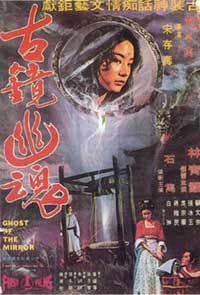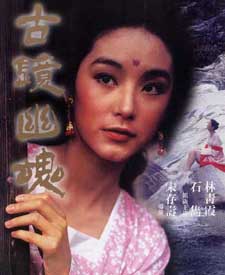 A wanderer enters the overgrown courtyard of an abandoned manse, a familiar setting for Chinese ghost stories & a evocative beginning for the Taiwanese Ghost of the Mirror (Gu jing you hun, 1974). The fellow sits in a comfortable location to eat his lunch. When he goes to the well for a drink, he is very soon the victim of a dangerous spirit within that well.
A wanderer enters the overgrown courtyard of an abandoned manse, a familiar setting for Chinese ghost stories & a evocative beginning for the Taiwanese Ghost of the Mirror (Gu jing you hun, 1974). The fellow sits in a comfortable location to eat his lunch. When he goes to the well for a drink, he is very soon the victim of a dangerous spirit within that well.
Teaser beginnings like this leave the viewer without the main cast as yet introduced, so the story has to start anew. A young scholar sets out for a quiet location in order to copy a sacred text one-hundred times for the sake of his mother's good health. This must be done while abstaining from meat, liquor, or women, keeping always a pious frame of mind.
The scholar is played by Shih Chien; or, Lin Ching Hsia, best known a similar role in King Hu's classic A Touch of Zen (Hsia Nu, 1971). He arrives with a young nephew, Ching, at the very manse about which rumors abound. Our pious noble does not believe in ghosts & plans to enjoy the retreat, unpestered thanks to superstition.
The soundtrack, in addition to a thuramin for spooky passages, is entirely cribbed from other films, & even a bit of Alora Ikufube's theme for Zatoichi will be heard. Stock music seems to have been grabbed willynilly & is mismatched from scene to scene. This is often distracting, but fortunately far fewer cheap shortcuts were taken for the appealing cinematography.
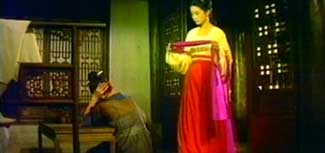 The "mirror" of the title is both the reflection in the bottom of the well, & a hidden relic that holds a good spirit captive to an evil will. The "mirror" of the title is both the reflection in the bottom of the well, & a hidden relic that holds a good spirit captive to an evil will.
The reflection in the well mesmerizes people until they go head-first into the water, their bodies never to be recovered. The scholar soon loses a hired worker in just this manner, & begins to wonder if superstitions are about something after all.
He sends Ching home & stays alone in the haunted manse. At night, the sound of a lion (or as it turns out, a dragon) comes up from the well. When he investigates, he becomes mesmerized by a woman's spirit smiling up at him where his own reflection should've been.
He almost leans far enough to fall, but his wholesome frame of mind for the sake of his mother & the sutras gives him strength to resist.
Soonafter a seductive ghostly woman comes to him, but cannot approach his buddhist rosary. knowing evil cannot triumph over virtue, he proceeds to copy scripture, unafraid of the seductive spirit. Yet she is friendly in her way, & slowly draws out his emotions & interest.
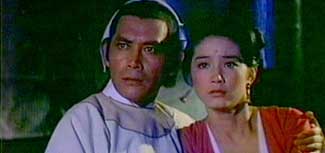 The ghost is that of a girl who committed suicide by drowning, Su-Su (Brigitte Yin; aka, Pai Yin). She does evil because of a dark power that forces her to do so. The ghost is that of a girl who committed suicide by drowning, Su-Su (Brigitte Yin; aka, Pai Yin). She does evil because of a dark power that forces her to do so.
Just as scholars always do in such tales, our hero falls for her & desires to save her, but knows he must remain chaste to copy the sutras.
He tries to balance a chivalrous sentiment toward the pretty ghost with the necessity to avoid temptation. She lives with him by night while he copies the sacred text, cares for him almost as would a wife, eager as she is to stay out of the well wherein evil dwells.
It's the rule of such tales that the dead & the living cannot cohabit safely. So periodically a green shadow comes over her & she has to struggle to do him no harm.
In his desire to save her from a dark dragon, he climbs into the well & discovers a cavern, seeking the antique bronze mirror that ensnares her essence. In the caverns he finds bones of the many victims of the well. At last he finds an old box containing the bronze mirror, & brings it back with him to the surface.
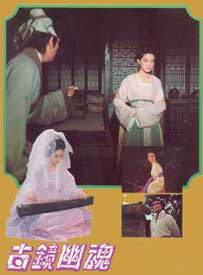 The mirror is inhabited by Yuenyi (or Yao Ying) who looks like Su-Su but seems to be a different personality, one that is untained by the dragon. The mirror is inhabited by Yuenyi (or Yao Ying) who looks like Su-Su but seems to be a different personality, one that is untained by the dragon.
Although the "two" ghosts do seem likely to be the same, the Yuenyi personality is braver & even more pleasant. And now that the mirror has been removed from the dark, Yuenyi can even thrive in the daylight, as Su-Su could not.
Enamored as he had been of Su-Su, his feelings are much stronger for Yuenyi. When only one sutra remains to be completed, the Dragon appears first as a witch-woman then as an actual dragon.
Su-Su & Yuenyi have by this time ceased to be distinct personality, being fully merged. She helps attach the sutras to the mansion walls & ceiling to keep the dragon at bay.
The dragon FX is obvious puppetry & kind of cheap, but even so thrilling. The mansion is crushed & Su-Su must save the man she loves even if it means her destruction & his sadness.
Although slight, this is a good film for the familiar plot. Brigitte Lin was not yet the international star she was soon to become, & this is just about as young as ever she can be seen. Her gleaming beauty alone could've carried the movie.
copyright © by Paghat the Ratgirl
|
